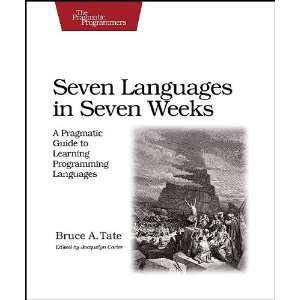on quite a reading binge. One book I started working my way
through is Seven Languages in Seven Weeks. This is a neat
introduction to a slew of languages that focuses on their
quirky, unique aspects.
I think the list is Ruby, Io, Scala, Haskell, Prolog, Erlang, and
Clojure, so their is a good mix of functional, declarative,
object-oriented, and actor-based concurrency languages, as well as a
good spread from static to dynamic. In fact, their may be a scatter
plot in the making there.
The book starts with Ruby. I believe Ruby is the easiest of the
languages to learn, but I was still interested because I want to pick
up CoffeeScript, which borrows much from it. I was really impressed
with the interactions between blocks, the collections classes, and the
IO system.
Python supports some inkling of this, but I found the Ruby
support much more fundamental to the language. I've always disliked
writing for loops for the purposes of collections processing, and Ruby
really does away with this. They also support ranges and slices in a
much more unified way that Python
One thing I just saw a nibble of, but which interested me was the
language-integrated support for Regex matching, ala Perl. While some
of the implicit globals for string processing ($. is the line number of
the last input read?) were a little gross, I thought this was really
nice. I'd be interested to see how elegant a more general context-free
grammar parsing framework could be. I couldn't find a way to run Ruby
one-liners from the command-line, which is a pity because I've been
looking for a reason not to learn awk, and this seemed promising.
I was a little thrown off by the highly dynamic nature of Ruby. Ruby
supports things like open classes and overriding method_missing. These
are really powerful, as Seven Languages mentions, for things like
database adapters and XML frameworks, but making them efficient at
runtime seems daunting. It seems like they would really defeat alot of
JIT compilers, that try to do things like find consistent implicit
class structures. Most code I write has fairly stern performance
requirements, so I'm not sure it's the right language for me.
Next, on to Io!

It seems like they would really defeat alot of
ReplyDeleteJIT compilers, that try to do things like find consistent implicit
class structures.
Ruby has no production-ready JIT compiler: problem solved ;-)
Hehe, fixes that!
ReplyDeleteV8 has a nice design doc explaining what they did for JavaScript, under Fast Property Access: http://code.google.com/apis/v8/design.html
I think method_missing is still too general to easily handle that, but you might be able to capture the common case.